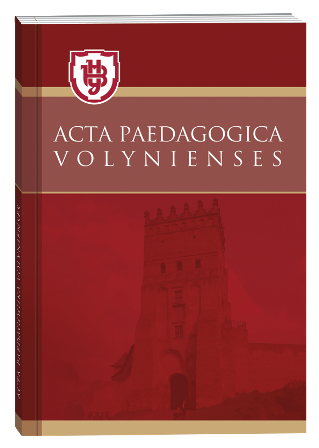PEDAGOGICAL CONDITIONS FOR THE FORMATION OF COLOR COMPETENCE OF FUTURE DESIGN SPECIALISTS
DOI:
https://doi.org/10.32782/apv/2023.6.8Keywords:
color science, color, pedagogical conditions, competence, color competenceAbstract
The article examines the pedagogical conditions for the formation of coloristics competence of future students, which is a component of professional competencies described in the educational program of specialty 022 Design. It has been proven that the formation of coloristic competence is possible under the condition the presence of a complete system of the educational process, which functions in certain pedagogical conditions. In the context of the conducted research, pedagogical conditions are considered as a set of measures of the educational process, which provide higher education seekers with the necessary level of education color competence and contribute to increasing its effectiveness process. It is emphasized that the process of formation of coloristic competence possible under the following conditions: combination of theory and practice; use in educational process of modern innovative technologies and Internet resources; the presence of a complete methodical system and scientific base; involvement in teaching activity of practicing professionals.The specified conditions, which are based on the specified theoretical methodological approaches and aimed at the formation of creative potential students, coordinated with the educational work program of color science, in which theory and practice are integral, interconnected system and involves the implementation of a number of tasks, including the understanding of the main ones laws of color, familiarity with the theory of color vision, color symbolism and its influence on human emotions. It is noted that color is a socio-cultural phenomenon, which has connotations the object of research by scientists in various fields. Color perception is complex a process taking into account physical and psychophysiological regularities human receptor activity. A number of tasks have been developed and tested within the framework of the educational program color science, as it is the most effective in acquiring skills and abilities there is practical training in coloristics.
References
Бражнич О. Г. Педагогічні умови диференційованого навчання учнів загальноосвітньої школи : дис. канд. пед. наук. Кривий Ріг, 2001. 238 с.
Вдовичин Т. Я. Обгрунтування організаційно-педагогічних умов для забезпечення навчального процесу майбутніх фахівців у педагогічному університеті. Сучасні інформаційні технології та інноваційні методики навчання в підготовці фахівців: методологія, теорія, досвід, проблеми. 2013. Вип. 34. С. 225–230.
Даниленко В. Дизайн України у світовому контексті художньо-проектної культури : монограф. Харків : ХДАДМ, Колорит, 2005. 244 с.
Зубко А. М. Організаційно-педагогічні умови удосконалення навчального процесу в системі підвищення кваліфікації педагогічних кадрів : автореф. дис. на здобуття наук. ступеня канд. пед. наук : спец. – 13.00.04 «Теорія і методика професійної освіти». Київ, 2002. 22 с.
Манько В. М. Дидактичні умови формування у студентів професійно-пізнавального інтересу до спеціальних дисциплін. Соціалізація особистості: зб. наук. пр. Національного педагогічного університету ім. М. Драгоманова. К. : Логос, 2000. Вип.2. С. 153–161.
Підготовка майбутнього вчителя до впровадження педагогічних технологій: Навч. посіб. К. : В-во А.С.К., 2003. 240 с.
Хриков Є.М. Педагогічні умови в структурі наукового знання. Шлях освіти. 2011. № 2. С. 6–15.







